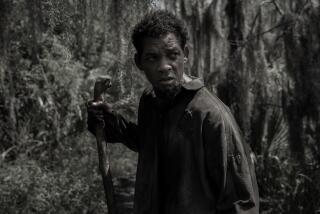HOME THEATER : A SECOND LOOK : ‘The Exiles’ is an excavation : Almost lost itself, the 1961 film digs into a civic and cinematic past worth preserving and treasuring.
- Share via
Kent Mackenzie’s “The Exiles” feels like a snapshot from another era -- not just 1961, when it was completed, but a time when realist filmmaking was not reflexively equated with aimless story lines and haphazard camera work.
Set in Bunker Hill, before its decaying mansions were flattened to make room for a warren of skyscrapers, the movie follows three displaced Native Americans through the course of a single night. There are hints of story: Yvonne (Yvonne Williams), a pregnant Apache, passes a lonely evening at the movies while her husband Homer (Homer Nish), a beefy Hualapai, spends aimless hours drinking, eventually starting a bar fight to relieve his boredom.
His friend Tommy (Tommy Reynolds), a self-styled ladies’ man, picks up and mistreats a succession of women, ending up at a drunken hilltop gathering where dozens of Native Americans chant and drum.
The movie’s most enthralling sequences are when the camera floats free from the narrative altogether and simply takes in the surroundings. As Homer sits idly at a corner table, the film observes his fellow drinkers, men with worn, scarred faces, and a gay couple that mingles with the straight crowd. The night scenes glow and shimmer, evoking the lonely luminescence of Edward Hopper and the street scenes of Paul Strand.
According to his master’s thesis on the making of the film -- part of the copious and fascinating bonus material appended to Milestone’s new two-disc DVD release, out this week -- director Mackenzie took a stab at financing the project through traditional channels after his graduation from USC in 1956, but he could find no investors. In fact, “The Exiles’ ” 1961 press kit reads like something right out of the modern-day Sundance era, touting budgetary exigencies and savings accounts emptied.
The movie lay virtually forgotten until Thom Andersen, a USC grad and CalArts professor, singled it out in his cinematic essay “Los Angeles Plays Itself” for capturing a piece of the city’s essence. The Milestone discs include the relevant excerpts from Andersen’s film, which has never gotten a proper commercial release; their washed-out quality only emphasizes the astonishing restoration performed by the UCLA Film & Television Archive.
Following in the quasi-documentary tradition of Robert Flaherty and Joris Ivens, Mackenzie spent months absorbing the lives of Native Americans in downtown Los Angeles, forming relationships and gathering stories, before settling on his three leads. None had acting experience, but Mackenzie turns their rawness to his advantage. Their unselfconscious performances, utterly devoid of falsehood, prevent the film from slipping into alienated observation.
The voice-over, which is passed from one character to the next as their paths diverge, is halting and unpolished. Notwithstanding the arid echo of the post-synced sound, it sounds as if it were made up on the spot.
In spite of its title, “The Exiles” makes few explicit references to its characters’ origins, though their sense of dislocation is captured when Homer receives a letter from home. Rather than having him read the missive aloud, Mackenzie cuts to his family, sitting in the sun outside a wooden shack in rural Arizona. The juxtaposition is elemental, and almost unbearably poignant, as if a mere hint is enough to transport Homer back to a place that is never far from his mind.
Milestone’s DVD treats the almost-vanished film like a national treasure, adding four of Mackenzie’s shorts, including his 1956 documentary on Bunker Hill, commentary by Native American author Sherman Alexie and critic Sean Axmaker and an unfilmed script by Mackenzie, who died in 1980.
The supplements not only serve to pay just tribute to a cinematic landmark, but they also excavate the layers of meaning hidden beneath its apparently simple surface. With each viewing, “The Exiles” grows richer and more complex, leaving still more to be unearthed.
--
More to Read
Only good movies
Get the Indie Focus newsletter, Mark Olsen's weekly guide to the world of cinema.
You may occasionally receive promotional content from the Los Angeles Times.










